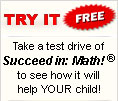Archive for the ‘tips on how to help your child overcome dyscalculia’ tag
Tips On How To Help Your Child Overcome Dyscalculia
As a parent, some of the most challenging times is dealing with your child’s education, development, and homework. When your child enters grade school, the dynamic of it all kind of changes. Before, you used to have complete control over your child’s development, schedule, day, interaction with others…but once school starts, a parent has to hand over the gauntlet to his/her teachers.
Once your child goes to school, some concerns may begin to arise that were never even a concern before. Learning disabilities,and social acceptance are just a few.
 Once it becomes apparent your child has a learning disability, this can shake things up a bit in your world. How do you handle it? How do you help your child overcome it? Many questions can arise, along with fear and stress. Most learning disabilities have treatment options, and different ways to help your child develop on time and on target with the rest of his/her class.
Once it becomes apparent your child has a learning disability, this can shake things up a bit in your world. How do you handle it? How do you help your child overcome it? Many questions can arise, along with fear and stress. Most learning disabilities have treatment options, and different ways to help your child develop on time and on target with the rest of his/her class.
Dyscalculia is one learning disability you may face with your child. It’s much like dyslexia, only it’s having difficulty with simple math concepts. Working with your child to recognize numbers and understand math is obviously the first step. Software to help your child is also available. Making Math More Fun is a printable math games collection I personally recommend.
Tips on How to Help Your Child Overcome Dyscalculia – What to do if your child has dyscalculia
1. Get a math workbook from Target or Walmart (you can usually pick one up for relatively cheap, a few dollars). Start at the beginning. Instead of getting a workbook for your child’s age group, start off with the absolute basic and easiest you can find. Example: preschool and kindergarten levels. This will help you in determining exactly what your child is struggling with, and what they do and don’t understand.
2. Spend some time every night sitting with your child helping them and encouraging them. Watch them answer questions, and answer any questions they might have with patience.
3. Download a software game they can play to help encourage math learning, and recognition.
4. Buy some flash cards (again from Walmart or Target – a few dollars at most). Spend a few minutes each night going through them. Shapes, numbers, and simple addition problems will work the best. (Dyscalculia is not to be confused with a child just struggling with math in general. That’s to be expected. Read more about symptoms of dyscalculia here.)
If your child has been diagnosed with dyscalculia, do not worry. If it’s left untreated of course it can cause issues in your child’s life, but many children are able to overcome this learning disability and go on to become doctors, and lawyers. Do the best you can to support your child emotionally, and offer as much help and guidance as you can…and the rest will follow.
